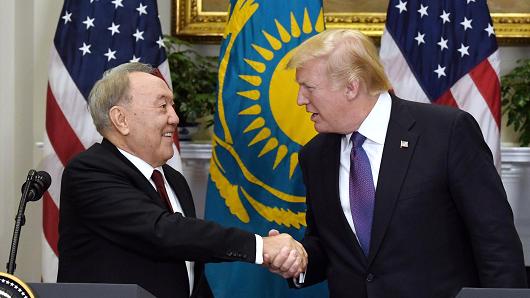 President Donald Trump hosted the president of Kazakhstan on Tuesday at the White House, where the official agenda included Afghanistan and nuclear nonproliferation.
President Donald Trump hosted the president of Kazakhstan on Tuesday at the White House, where the official agenda included Afghanistan and nuclear nonproliferation.
- President Donald Trump hosted President Nursultan Nazarbayev of Kazakhstan at the White House on Tuesday.
- An autocrat who won his most recent election by 98 percent of the vote, Nazarbayev is an unusual foreign leader to be hosted by the White House.
- Yet experts said that, at the moment, the United States has strategic challenges that make Kazakhstan a critical partner.
President Donald Trump hosted the president of Kazakhstan on Tuesday at the White House, where the official agenda included Afghanistan and nuclear nonproliferation. Seen on TV, President Nursultan Nazarbayev looked like any other visiting world leader, standing a few feet away from Trump at a lectern, his country's flag behind him.
But Nazarbayev is not like most of the world leaders who visit the White House.
Nazarbayev is known as an autocrat, who uses sham elections to extend his nearly three decades in power. In 2015, for instance, he was "re-elected" with nearly 98 percent of the vote. Nazarbayev is also fabulously wealthy in a country where per capita GDP is just over $8,000 a year. In 2013, he reportedly paid rapper Kanye West $3 million to perform at his grandson's wedding.
And then there's the corruption: By some estimates, around a quarter of Kazakhstan's GDP flowed out of the country during the first decade after the fall of the Soviet Union. Top Kazakh businessmen have been accused of bribery and money laundering around the world.
So why, then, did the White House roll out the red carpet for the leader of a government that rejects many of the United States' founding principles?
"Central Asia is the back-door shipping channel to Afghanistan," said Stronski. "When we have problems with Pakistan, we need other supply routes. So a country like Kazakhstan becomes much more important strategically."
The U.S.-Pakistan relationship is currently in free fall, following an announcement by the State Department earlier this month that the U.S. would suspend approximately $1 billion in annual security aid to Pakistan, citing the country's failure to crack down on terror cells within its borders.
The break with Pakistan is a key part of Trump's South Asia strategy, which the president said Tuesday was "working far more rapidly than anybody would understand."
Another reason for hosting Nazarbayev, Stronski said, was in recognition of his "long history and laudable record" of supporting nuclear nonproliferation.
"The Russians tested nuclear weapons there," Stronski said, "so it's a very personal issue for the nation. But it's also something that gets Nazarbayev into meetings with top leaders who might otherwise avoid meeting with him."
Trump on Tuesday called Kazakhstan "a valued partner in our efforts to rid the Korean peninsula of nuclear weapons ... and prevent the North Korean regime from threatening the world with nuclear devastation."
Kazakhstan also has a close relationship with Russia, Stronski said, although the alliance has been strained ever since Russia's annexation of Crimea in 2014. "They're in the unenviable position of trying to act as a mediator between the United States and Russia," he said.
At the Trump White House, which is embroiled in a special counsel investigation into Russian attempts to influence the 2016 election, Nazarbayev's efforts could prove even more complicated. Trump did not mention Russia on Tuesday.
Nor did the president specifically mention human rights or "rule of law" in his statements Tuesday. When CNBC asked the White House whether the issues came up in private meetings, an aide highlighted a line in a briefing paper put out after the meeting, which said the U.S. and Kazakhstan would fight terrorism "while respecting the rule of law and human rights."
Still, Stronski said he could not imagine that Trump's most recent predecessors would have been advised to host the Kazakh leader. "If President Obama or [George W.] Bush were talking about doing a meeting with Nazarbayev, we'd probably be asking, 'Do you really want to sit down with someone from a country with this human rights record and level of corruption?'"
Today, just one private company accounts for 4 percent of the country's economy: Eurasia Resources Group, which is owned by billionaires with ties to Moscow. And in October 2017, the Bank of New York froze 40 percent of the assets of Kazakhstan's sovereign wealth fund, part of a legal dispute over alleged government corruption.
For Trump, whose sprawling real estate company has come under scrutiny for potential money laundering, Kazakh corruption issues hit very close to home. According to Bloomberg News, millions of dollars from a Kazakh mineral company flowed into a development company that partnered with Trump to build the Trump SoHo hotel and condominiums in New York.
Asked by reporters on Tuesday whether there was any Kazakh money in the Trump Tower Soho project, Trump looked up, surprised. "No idea. Really no idea," he said.
Yet in a region dominated by autocracies and rampant with organized crime, Kazakhstan is better than most, said Louise Shelley, director of the Terrorism, Transnational Crime and Corruption Center at George Mason University, and an expert in Russia and Eastern Europe.
"Kazakhstan has high levels of corruption, like every country in Central Asia," she said. "But the political elite is not as interwoven with organized crime there as it is in Russia or Azerbaijan. It's more of a kleptocracy than an organized crime state."
Stronski agreed. "Of all the leaders in Central Asia, if we're going to have a White House meeting and photo op, it makes sense for senior leaders to do this with Kazakhstan," he said.




